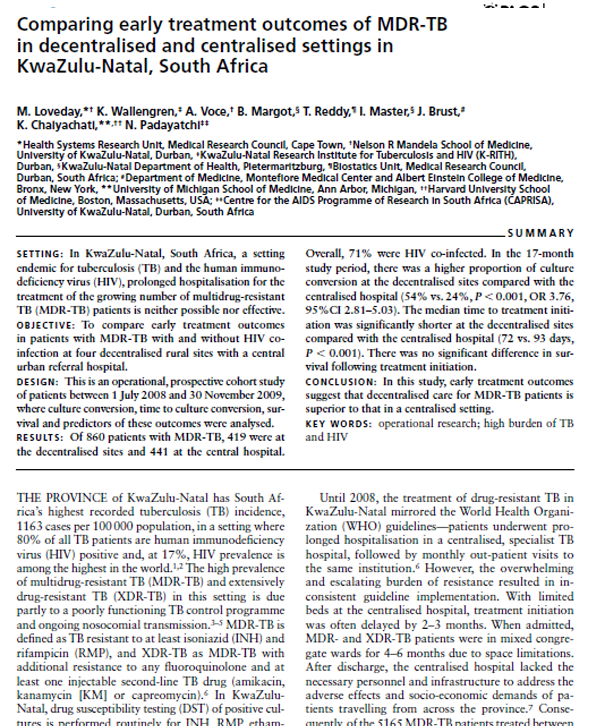Date: 1 February 2012
Authors: Loveday, M. 1 ; Wallengren, K. 2 ; Voce, A. 3 ; Margot, B. 4 ; Reddy, T.5 ; Master, I. 4 ; Brust, J. 6 ; Chaiyachati, K. 7; Padayatchi, N. 8 ;
Publisher: International Union Against Tuberculosis and Lung Disease
SETTING: In KwaZulu-Natal, South Africa, a setting endemic for tuberculosis (TB) and the human immunodeficiency virus (HIV), prolonged hospitalisation for the treatment of the growing number of multidrug-resistant TB (MDR-TB) patients is neither possible nor effective. OBJECTIVE: To compare early treatment outcomes in patients with MDR-TB with and without HIV coinfection at four decentralised rural sites with a central urban referral hospital.
DESIGN: This is an operational, prospective cohort study of patients between 1 July 2008 and 30 November 2009, where culture conversion, time to culture conversion, survival and predictors of these outcomes were analysed.
RESULTS: Of 860 patients with MDR-TB, 419 were at the decentralised sites and 441 at the central hospital. Overall, 71% were HIV co-infected. In the 17-month study period, there was a higher proportion of culture conversion at the decentralised sites compared with the centralised hospital (54% vs. 24%, P < 0.001, OR 3.76, 95%CI 2.81–5.03). The median time to treatment initiation was significantly shorter at the decentralised sites compared with the centralised hospital (72 vs. 93 days, P < 0.001). There was no significant difference in survival following treatment initiation.
CONCLUSION: In this study, early treatment outcomes suggest that decentralised care for MDR-TB patients is superior to that in a centralised setting. KEY WORDS: operational research; high burden of TB and HIV
Keywords: high burden of TB and HIV; operational research
Affiliations: 1: Health Systems Research Unit, Medical Research Council, Cape Town, South Africa; and Nelson R Mandela School of Medicine, University of KwaZulu-Natal, Durban, South Africa 2: KwaZulu-Natal Research Institute for Tuberculosis and HIV (K-RITH), Durban, South Africa 3: Nelson R Mandela School of Medicine, University of KwaZulu-Natal, Durban, South Africa 4: KwaZulu-Natal Department of Health, Pietermaritzburg, South Africa 5: Biostatics Unit, Medical Research Council, Durban, South Africa 6: Department of Medicine, Montefiore Medical Center and Albert Einstein College of Medicine, Bronx, New York, USA 7: University of Michigan School of Medicine, Ann Arbor, Michigan, USA; Harvard University School of Medicine, Boston, Massachusetts, USA 8: Centre for the AIDS Programme of Research in South Africa (CAPRISA), University of KwaZulu-Natal, Durban, South Africa

